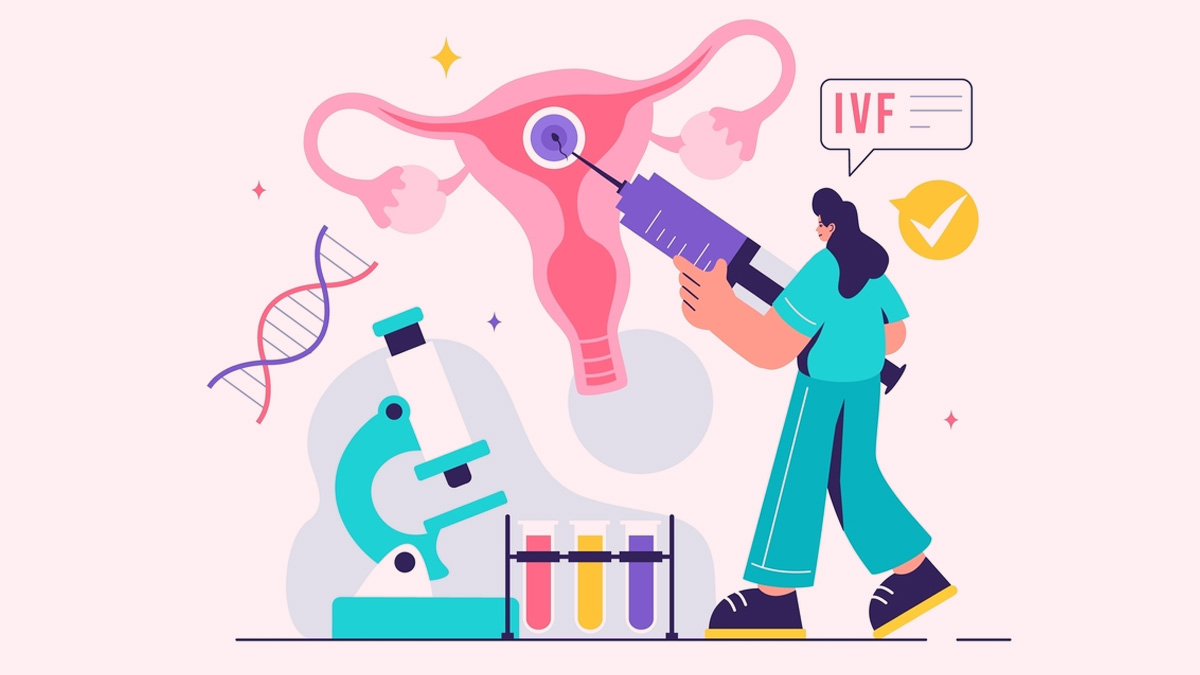
Breast cancer is a journey that many women face, and while it can be incredibly challenging, advances in treatment mean that many are now thriving after their diagnosis. Once treatment is over, though, many survivors find themselves thinking about their future, especially when it comes to starting or growing their families. Cancer treatments can affect fertility, leading to questions about whether it’s safe to pursue options like In Vitro Fertilisation (IVF). We spoke to our expert Dr Kshitiz Murdia, CEO and Co Founder, Indira IVF, who explained what women need to know about trying to conceive after breast cancer treatment.
Table of Content:-
What Is Breast Cancer?

"Breast cancer remains one of the most prevalent and challenging health issues affecting women worldwide. It is marked by the uncontrolled growth of abnormal cells that starts in the milk ducts or lobules. If not treated early, it can lead to the formation of tumours that may spread to other areas of the body," said Dr Murdia.
While early-stage breast cancer (in situ) is generally not life-threatening and can be effectively managed, invasive forms pose a greater risk by spreading into surrounding tissue. According to the World Health Organization (WHO), 2.3 million women received a breast cancer diagnosis, leading to 6,70,000 deaths globally.
The condition affects women across all age groups, though the risk of diagnosis increases significantly as they grow older. Fortunately, advances in early detection and treatment have significantly improved survival rates, giving millions of women the chance to lead healthy, fulfilling lives after a breast cancer diagnosis.
Also Read: Breast Cancer Awareness Month: Expert Explains The Role Of Gut Health In Breast Cancer Prevention
Advances in Detection and Treatment

"However, for many survivors, the end of cancer treatment marks the beginning of a new journey — one that involves reassessing their plans for starting or expanding a family. The impact of cancer therapies, such as chemotherapy, radiation, and hormone treatments, can affect ovarian function, sometimes leading to temporary or permanent infertility," added Dr Murdia.
For those who wish to conceive after recovery, navigating the complexities of fertility options, including IVF, requires careful consideration of timing, safety, and overall health.
Is IVF Safe After Breast Cancer?

"Several recent studies suggest that, under the right circumstances, pursuing fertility treatments after breast cancer can be a viable and safe option. However, it is essential to approach this decision cautiously, considering the type of cancer, its treatment, and the patient's overall health," said Dr Murdia.
Oncologists often recommend waiting a certain period after completing cancer treatment before attempting to conceive. This waiting period allows the body to recover and ensures that there are no lingering effects from the therapy that could compromise pregnancy or increase the risk of cancer recurrence.
"The exact time frame varies from case to case. In general, doctors may advise waiting at least 2-3 years post-treatment before considering pregnancy. This period is often viewed as a 'safety window' because the risk of recurrence is typically highest during the first few years following treatment," explained Dr Murdia. For some women, a longer waiting period may be necessary, particularly if they have undergone hormone therapy, which can extend for up to five years depending on the individual case.
Also Read: Breast Cancer Treatment: Expert Explains Its Link With Heart Disease And How DASH Diet Can Help
Considerations Before Pursuing IVF
Undergoing IVF after breast cancer treatment requires careful planning and consideration of several crucial factors. One of the primary steps is to ensure thorough consultations with oncologists and fertility specialists, allowing for a comprehensive evaluation of the patient’s health.

Assessing Potential Risks
This approach helps assess potential risks, including cancer recurrence, hormone sensitivity, and any complications that might arise during pregnancy. "Monitoring hormone levels is particularly essential, especially for patients with hormone-sensitive cancers, as elevated oestrogen levels typically associated with IVF can sometimes stimulate the growth of cancer cells," explained Dr Murdia.
Comprehensive Health Assessment
"Equally important is a comprehensive health assessment before attempting conception, which should involve a detailed review of the patient’s overall health status, the impact of previous cancer treatments on reproductive function, and the current state of cancer remission," added Dr Murdia. Such assessments ensure a personalised and well-informed fertility plan, empowering patients to move forward with greater confidence and peace of mind.
The Viability of Parenthood After Breast Cancer
With advancements in medical science, surviving breast cancer no longer means having to give up the dream of becoming a parent. While the path to parenthood after breast cancer may be complex and fraught with concerns, it is increasingly becoming a viable reality for many.
Bottomline
Dr Murdia concluded, “Women who have been diagnosed with breast cancer and wish to pursue IVF should work closely with their medical teams to determine the safest and most effective approach. Each case is unique, and with the right planning, timing, and support, women can make empowered choices about their fertility post-treatment.”
[Disclaimer: This article contains information provided by an expert and is for informational purposes only. Hence, we advise you to consult your own professional if you are dealing with any health issues to avoid complications.]
Also watch this video
How we keep this article up to date:
We work with experts and keep a close eye on the latest in health and wellness. Whenever there is a new research or helpful information, we update our articles with accurate and useful advice.
Current Version